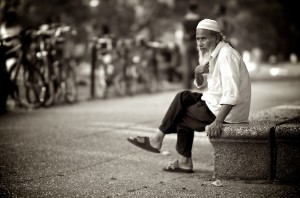
Courtesy of Pablo Benavente
The report, by the nonprofit, non-partisan group based at University of Miami, found that elderly women are more likely to live alone and face higher poverty rates than men. But poverty is even higher for black and Hispanic women. Elderly black women are more likely to be widows because black men don’t live as long as white men. The average white man lives seven years longer than the average black man.
Older white men are better off financially than any other elderly group, but suicide is most prevalent for the widowed among them, according to the report. The suicide rate for white men over 80 is six times the overall average in the U.S., and three times the rate for black men of the same age.
Blacks and Latinos have a tougher time financially during retirement than whites for a number of reasons. For instance, poverty is more prevalent among elderly people of color, who are less likely to have workplace retirement plans than whites.
The elderly population in D.C. is majority black, but whites 75 and older in the city are more likely to live alone, according to census estimates:
| Total households with someone 75+ | One-person, 75+ households | Percentage of one-person, 75+ households | |
|---|---|---|---|
| Black | 17,337 | 7,979 | 46% |
| White | 7,590 | 4,549 | 60% |
| Hispanic | 859 | 373 | 43% |
*Source: 2010 U.S. Census Bureau estimates
Some other take-aways from the report: women over 60 who live alone are happier than married women of the same age, and older, solitary men have more trouble maintaining social networks than women living alone.





